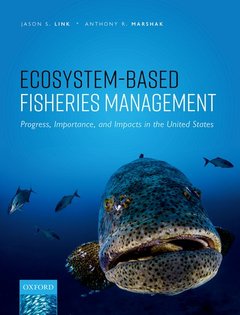Description
Ecosystem-Based Fisheries Management
Progress, Importance, and Impacts in the United States
Authors: Link Jason S., Marshak Anthony R.
Language: English
Subjects for Ecosystem-Based Fisheries Management:
133.90 €
In Print (Delivery period: 21 days).
Add to cart
Publication date: 11-2021
712 p. · 19.7x25.4 cm · Hardback
712 p. · 19.7x25.4 cm · Hardback
Description
/li>Biography
/li>
Ecosystem-based fishery management (EBFM) is rapidly becoming the default approach in global fisheries management. The clarity of what EBFM means is sharpening each year and there is now a real need to evaluate progress and assess the effectiveness and impacts. By examining a suite of over 90 indicators (including socioeconomic, governance, environmental forcing, major pressures, systems ecology, and fisheries criteria) for 9 major US fishery ecosystem jurisdictions, the authors systematically track the progress the country has made towards advancing EBFM and making it an operational reality. The assessment covers a wide range of data in both time (multiple decades) and space (from the tropics to the poles, representing over 10% of the world's ocean surface area). The authors view progress towards the implementation of EBFM as synonymous with improved management of living marine resources in general, and highlight the findings from a national perspective. Although US-centric, the lessons learned are directly applicable for all parts of the global ocean. Much work remains, but significant progress has already been made to better address many of the challenges facing the sustainable management of our living marine resources. This is an essential and accessible reference for all fisheries professionals who are currently practicing, or progressing towards, ecosystem-based fisheries management. It will also be of relevance and use to researchers, teachers, managers, and graduate students in marine ecology, fisheries biology, biological oceanography, global change biology, conservation biology, and marine resource management.
Jason S. Link is Senior Scientist for Ecosystem Management with the National Oceanic and Atmospheric Administration's (NOAA) National Marine Fisheries Service (NMFS), USA. In this role, he leads approaches and models to support development of ecosystem-based management plans and activities throughout the agency, serving as the agency's senior-most authority on ecosystem science. Dr. Link holds an adjunct faculty position at the School for Marine Science and Technology at the University of Massachusetts, is a fellow of the American Institute of Fishery Research Biologists, and has received a Department of Commerce Bronze Medal and the Fisheries Society of the British Isles Medal for significant advances in fisheries science. Anthony R. Marshak is Program Analyst with CSS, Inc. in support of the National Oceanic and Atmospheric Administration's National Centers for Coastal Ocean Science (NCCOS), USA. Prior to this role, he worked as a Research Associate in the NMFS Office of Science and Technology where his duties included co-leading its habitat science program, organizing workshops and symposia, and collaborating with the NMFS Senior Scientist for Ecosystem Management. Dr. Marshak has conducted research on a variety of topics including coral reef fisheries ecology, climate-related range shifts, the effects of marine protected areas, and socioecological studies related to ecosystem-based management.
© 2024 LAVOISIER S.A.S.




